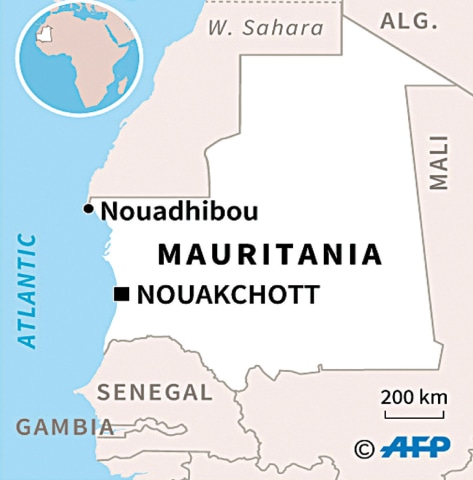
NOUAKCHOTT: Scores of migrants who swam through rough Atlantic Ocean waters to safety from a capsized boat were receiving care on Thursday in Mauritania after 58 others drowned in one of the deadliest disasters this year among people making the perilous journey to Europe.
The boat that left Gambia a week ago had been carrying at least 150 people, including women and children. It was headed towards Spain’s Canary Islands but tried to approach the Mauritanian coast to get fuel and food, said Laura Lungarotti, chief of mission in the West African nation with the UN migration agency.
“Many drowned. The ones who survived swam up to the Mauritanian coast close to the city of Nouadhibou,” she said. “The survivors were recovering from shock,” she said, adding that they were given first aid kits, blankets and other supplies.
Local authorities searched for an unknown number of missing people.
At least 83 people swam to shore, including two women and at least 10 minors, the UN agency said. Mauritanian authorities said they found at least 85 survivors, 10 of whom were taken to the hospital for urgent treatment.
“The survivors were receiving care in accordance with human solidarity, fraternity and African hospitality,” Interior Minister Mohamed Salem ould Merzoug said in a statement that estimated the boat held as many as 180 people, most of them aged 20 to 30.
“Mauritania will open an investigation into those responsible for this drama including possible trafficking networks,” the statement said.
While thousands once died off Mauritania’s coast in attempts to reach the Canary Islands between 2005 and 2010, that later calmed, the statement said. But in recent months authorities have detained boats mostly carrying hundreds of migrants from Senegal, which neighbours Gambia, it said.
Survivors said the boat that capsized had left Gambia on Nov 27. Gambian consular officials were meeting with survivors.
In recent years, tens of thousands of people have set off from Gambia in hopes of reaching Europe. Despite the country’s small size, more than 35,000 Gambians arrived in Europe between 2014 and 2018, according to the UN migration agency.
A 22-year oppressive rule by former President Yahya Jammeh severely affected the country’s economy, especially for youth, and contributed greatly to the exodus. Since Jammeh fled into exile in January 2017 after a surprise election loss, European countries have been pushing to return asylum seekers.
But Gambia’s economy still suffers. The coastal nation was shaken earlier this year by the collapse of British travel company Thomas Cook. At the time, Gambia’s tourism minister said the government convened an emergency meeting on the collapse, while some Gambians said the shutdown could have a devastating impact on tourism, which contributes more than 30 per cent of the country’s GDP.
Published in Dawn, December 6th, 2019














































Dear visitor, the comments section is undergoing an overhaul and will return soon.